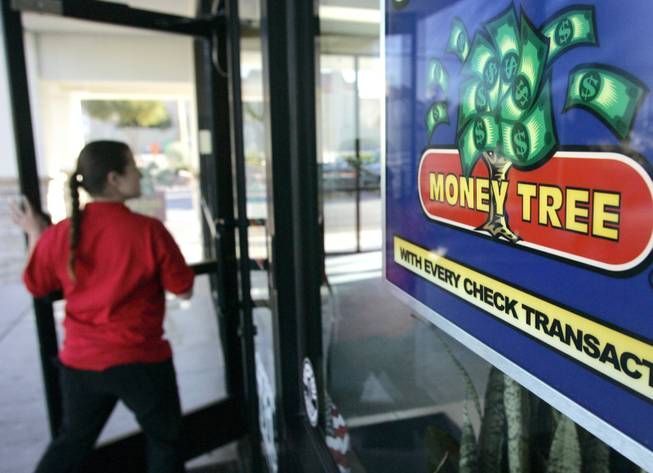
“Why on earth would you want to reduce separation between these establishments from 1,000 feet to 660 feet? This would allow two or three in the same mall,” the leader of a citizens group representing neighbors in the Southwest part of the valley said of a change suggested to appease the check cashing industry.
Monday, Feb. 11, 2008 | 2 a.m.
Sun Archives
For many Clark County residents, check cashing joints are about as desirable as poison ivy.
Largely because of that sentiment, local governments have cracked down on such businesses in recent years with laws that require minimum distances from residential properties and between one check cashing store and another.
Now, a new problem has arisen. Check cashing stores often get waivers from the county’s planning commission, essentially circumventing those restrictions.
“They seem to have no problem with payday loans or the proliferation of them,” County Commissioner Chris Giunchigliani said. “They need to be spread around.”
As a result, county commissioners will consider revising the law to eliminate waivers. A proposal will be introduced Feb. 20.
But that’s not the whole story.
Although the proposal would eliminate waivers, it also would reduce the distance requirements, potentially clearing the way for higher concentrations of check cashing stores.
Current county law requires such businesses to be 200 feet from residential properties and 1,000 feet from another check cashing store. That measure, passed in 2004, applies only to unincorporated Clark County, but other local governments followed suit, passing similar restrictions.
The new law would go in the opposite direction, reducing the distance requirement between check cashing stores from 1,000 feet to 660 feet.
It also would redefine how distances to residences are measured. Instead of using a straight line from property to property, the new law would measure the distance along the nearest pedestrian or vehicle route. That means a check cashing store could be just a few feet from a home, as long as there is a wall that would force someone to walk more than 200 feet to get from the store to the residence.
If the idea is to prevent a neighborhood from being inundated with check cashing joints and the high-interest loans that accompany them, why reduce the requirements?
Giunchigliani said the county’s planning staff suggested easing the requirements to make the new law more palatable for the check cashing industry. But putting an end to the waivers is the key thing, she said.
The reduced distance requirements aren’t likely to sit well with many of the residents whom Giunchigliani wants to help.
“Why on earth would you want to reduce separation between these establishments from 1,000 feet to 660 feet?” said Susan Ivy Allen, president of the Southwest Action Network, or SWAN, a citizens group representing neighbors in the Southwest part of the valley. “This would allow two or three in the same mall.”
Though the group endorses the elimination of waivers, it is skeptical of the other changes.
Greg Esposito is a member of the Paradise Town Advisory Board, one of 19 such neighborhood boards that make recommendations on zoning and use permit issues before they go to the Clark County Planning Commission. The board has concerns about check cashing businesses saturating certain areas and regularly deals with waiver requests, he said.
Getting rid of the waivers would be good, but reducing the distance requirements wouldn’t be, he said.
“Check cashing establishments don’t always have a positive perception in the public eye,” he said. “I don’t know that the neighborhoods would want the distances reduced.”
The check cashing industry is reviewing the proposal, but it has concerns about eliminating waivers.
“My view is, always allow discretion,” said Jim Marchesi, president of Check City.
Though the industry did not like the current law, it has worked very well, Marchesi said.
Despite the stigma, there is no proof that stores such as his have a detrimental effect on neighborhoods, he said.
SWAN’s Allen acknowledged that complaints about the stores are mostly anecdotal. But “you generally don’t get anecdotes like that from grocery stores or hair salons,” she said.
Metro Police said hard data about calls to check cashing stores weren’t immediately available.
“With any institution where there is money involved, there is propensity for crime,” said Officer Martin Wright, a Metro spokesman. Check cashing businesses often have better mechanisms to prevent fraud than banks, he said, but robberies at check cashing stores tend to involve weapons more often than at banks.
But holdups aren’t the real concern for many opponents of the lending practices at check cashing businesses.
“They are making a lot of money off the backs of minority and low-income families,” said Michele Johnson, chief executive of Consumer Credit Counseling Service.
Distance requirements aren’t likely to do much about that problem, she said.
“I don’t think whether you have to have 1,000 feet between them or 600 feet between them makes any difference,” she said. “I think to effectively monitor check cashing facilities, we need state legislation and we need a usury law.”
In the meantime, the county proposal scheduled to be introduced next week will likely be set for a public hearing in March.

Join the Discussion:
Check this out for a full explanation of our conversion to the LiveFyre commenting system and instructions on how to sign up for an account.
Full comments policy